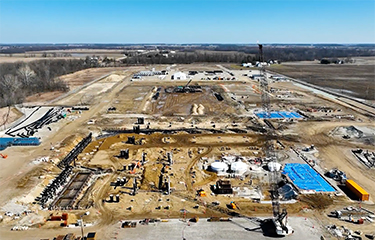Maynard, Massachusetts, U.S.A.-based AquaBounty Technologies’ Q1 2023 financial results indicate the company saw lower revenue and higher losses in the quarter.
The land-based recirculating aquaculture system (RAS) and biotechnology company earned USD 398,000 (EUR 363,000) in product revenue in the quarter, a year-over-year decrease of 59 percent compared to the USD 963,000 (EUR 879,000) the company sold in Q1 2022. The lower revenue was punctuated by larger net losses for the company, as it lost USD 6.5 million (EUR 5.9) compared to USD 5.1 million (EUR 4.6 million) it lost in the previous quarter.
According to AquaBounty CEO Sylvia Wulf, the losses are partially related to planned repairs the company needed to perform on its RAS salmon farm in the U.S. state of Indiana.
"The year-over-year revenue decline for the quarter was related to the scheduled downtime needed to make facility repairs,” she said.
The company also lost another revenue stream when it transitioned its Prince Edward Island, Canada grow-out facility to a broodstock maintenance and egg production facility. Wulf said the company sees increasing opportunities in selling salmon eggs to aquaculture operations.
“With the transition of our PEI grow-out facility to broodstock maintenance and egg production last August, we no longer are harvesting GE salmon from that farm,” Wulf said.
The two factors combined to result in much lower revenue, but Wulf said demand for the AquaBounty's fish “continues to exceed” its supply and the company had its “highest monthly harvest output to date” at its Indiana farm.
In its unaudited results, the company indicated as of Q1 2023 it had USD 72.7 million (EUR 66.3 million) in cash and cash equivalents, down from USD 101.6 million (EUR 92.7 million) it posted in December 2022. However, the company also indicated it had USD 127.3 million (EUR 116.1 million) in assets related to property, plant, and equipment as of the end of Q1 2023 – up from USD 106.2 million (EUR 96.9 million) it had at the end of Q4. All told, the company’s total assets were at USD 206 million (EUR 187.9 million) as of the end of Q1 2023, compared to USD 213 million (EUR 194 million) in Q4 2022.
In March, during Seafood Expo North America, Wulf told SeafoodSource that the company has had long-standing plans to “do a bit of a reset” at its Indiana facility as it continues to work on its Pioneer, Ohio, U.S.A.-based RAS.
“It is an aged facility with dated technology,” Wulf said of the Indiana RAS.
While the company is still “growing fish at the growth rates we’ve expected,” and AquaBounty is testing new technology and equipment, including an AI management system, at its Ohio facility.
“It is designed for operational research and production to refine or practices and test tools and process controls in preparation for Ohio,” Wulf said.
AquaBounty is still evaluating its financial options for advancing the project, Wulf said.
“The timing for the closing of our bond financing is still expected to be mid-year and we are closely monitoring bond interest rates, project cost estimates, and the general economic environment,” Wulf said.
AquaBounty's egg production business is also evolving, Wulf told SeafoodSource in March. The company sees potential in its ability to use conventional breeding – in addition to gene editing for companies that embrace the technology – to produce salmon that perform better in an RAS environment.
“If you can design a fish that thrives in that environment, regardless of whether it’s our fish or a non-transgenic fish, you’re setting up RAS for success,” Wulf said. “I think that’s part of what’s missing right now.”
Photo courtesy of AquaBounty Technologies







